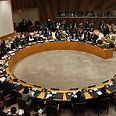
UN Security Council
צילום: AFP
UN powers say N Korea, Iran 'serious' nuke threats
In anticipation of nuclear talks, amid sudden resignation of IAEA deputy chief, security councils calls for denuclearized Middle East, point to Iran, N. Korea as major regional threat
Ahead of a round of major nuclear talks, five major powers labeled North Korea and Iran as "serious challenges" to the world's nuclear security Friday, citing their repeated defiance of international obligations.
Senior diplomats with the UN Security Council's five permanent members singled out North Korea's nuclear test in February and Iran's "continued pursuit of certain nuclear activities" as among the biggest threats to the 1970 Nuclear Non-Proliferation Treaty, the world's most important pact on preventing the spread of nuclear arms.
Related stories:
- North Korea sets preconditions for talks' restart
- Kerry disappointed by recent talks with Iran
- US, China pledge efforts for nuclear-free N. Korea
A joint statement by Britain, China, France, Russia and the United States also called for establishing the Middle East, where Iran enjoys close ties with Russia, as a zone free of nuclear weapons.
The statement preceded two weeks of talks in Geneva over the NPT, which has been signed by 190 nations and is credited with preventing the spread of nuclear weapons to dozens of nations in the 43 years since it entered into force.
Iran is a member, but North Korea – along with India, Pakistan and Israel – are not.
The treaty commits nations without nuclear weapons to refrain from acquiring them. Those with them commit to take steps toward their elimination. All who sign agree that everyone has a right to develop peaceful nuclear energy.
Nations meet every five years to review the treaty and try to find new approaches to old problems. The next such review will be in 2015.
Sen Pang, director-general of China's Arms Control and Disarmament Department, whose nation has close ties to North Korea, cautioned against a "vicious cycle" of confrontation with North Korea that could lead to war.
Earlier Friday, diplomats said that a top aide to the chief of the UN nuclear agency has unexpectedly resigned, suggesting tensions among the organization's top leadership.
The move comes at a critical time for the International Atomic Energy Agency. It is the outside world's only window on Iran's nuclear program, which some nations fear may be turned toward making weapons.
Two diplomats told The Associated Press Friday that Rafael Mariano Grossi, handed in his resignation this week to IAEA chief Yukiya Amano.
Grossi, of Argentina, was touted by some diplomats as a possible successor to Amano, who was re-elected for a second term earlier this year.
Both diplomats demanded anonymity because they are not authorized to discuss confidential IAEA information.
- Receive Ynetnews updates directly to your desktop










